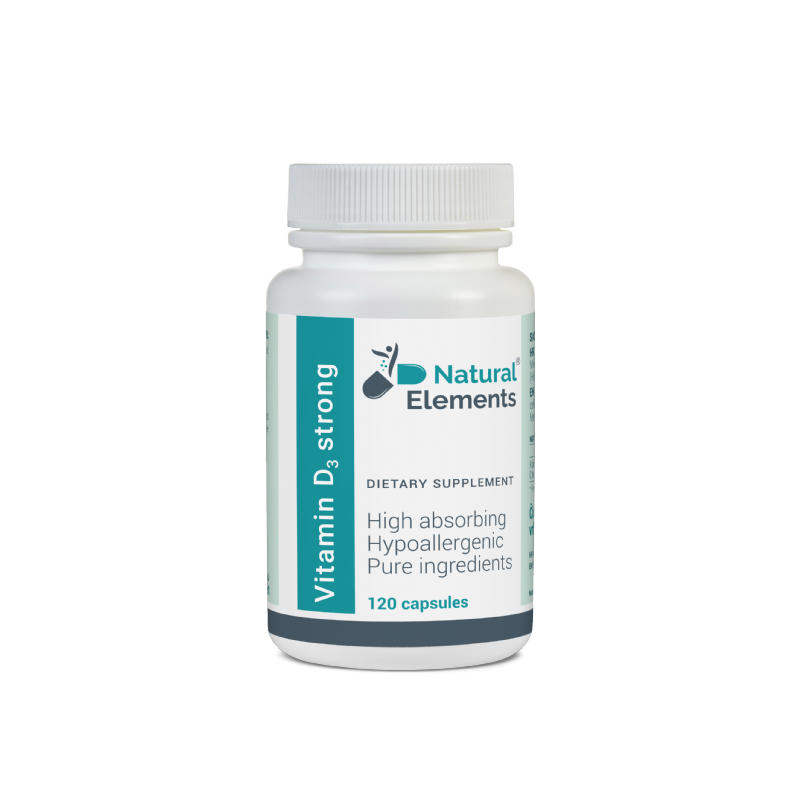Cholecalciferol (vitamin D3) is an essential fat-soluble vitamin and is the only one our body can produce when exposed to sunlight. Its formation promotes ultraviolet (UV-B) radiation in the skin. Cholecalciferol is a precursor of active vitamin D, which plays a central role in the regulation of calcium and phosphate metabolism. It is used as a mono preparation for the prevention and treatment of vitamin D deficiency. In combination with calcium it is used against osteoporosis.
Cholecalciferol is converted into the active ingredient calcitriol in the body. Vitamin D3 or calcitriol in the last phase acts as a hormone that controls different physical processes and fulfils very different functions. Scientists have known for a long time that vitamin D3 controls calcium intake and thus significantly affects bone health and stability. Today, however, it is known that the effect of vitamin D3 has several different functions.
Almost every cell in the body has vitamin D receptors, through which the vitamin, as a hormone, controls the secretion of various substances. It plays a significant role in the regulation of hormonal balance. Vitamin D even affects our genetic makeup and is responsible for controlling more than 2000 genes. It supports our defenceagainst disease by stimulating the immune system. In osteoarthritis, cholecalciferol has also been shown to reduce CRP and relieve pain.
Because of all these functions, it quickly becomes clear how important Vitamin D3 is to our immune system and cell and organ health. Doctors and specialists typically measure active levels of vitamin D in patients who are at risk of reduced vitamin D intake due to bowel disease (e.g., Crohn's disease or celiac disease) or impairment of renal function. Autoimmune diseases and obesity can also be causative factors for low levels of vitamin D. In these cases, a careful medical examination is required before deciding on supplementation.
At high doses of vitamin D3 there is a relative deficiency of vitaminK2 . K2 is responsible for transporting and recycling calcium absorbed by Vitamin D. With too little K2, calcium builds up in the body, leading to calcification of tissues, vessels and organs, which is very harmful to health. Vitamin D should be taken in an amount of 1000 IU along with vitamin K2. MK7, a natural form of Vitamin K2, is extracted from fermented plants. This form is particularly effective and is the only natural form of vitamins in dietary supplements. An optimal supply of vitamin K2 is given at a dose of 150-200 µg. This amount should also be taken as part of vitamin D therapy.
- contributes to normal absorption/utilisation of calcium and phosphorus
- contributes to the maintenance of normal bones and muscle function
Nutritional information
| Content | 5-day dose | %NRV* |
| Cholecalciferol | 100µg (4000IU) | 2000% |
* Nutrient Reference Value
Ingredients: Bulking agent: Microcrystalline cellulose, Capsule: HPMC (Hydroxypropyl MethylCellulose), Cholecalciferol
120 capsules, 24g
Recommendations:
Adults, 1 capsule every 5 days with meal.
The daily dose should not be exceeded.
The dietary supplement do not replace healthy diet.
Warnings:
Keep out of reach of children.
Store in a cold and dry place.
- contributes to normal absorption/utilisation of calcium and phosphorus
- contributes to normal blood calcium levels
- has a role in the process of cell division
- contributes to the normal function of the immune system
- contributes to the maintenance of normal muscle function
- contributes to the maintenance of normal bones
- contributes to the maintenance of normal teeth
Recommendations:
Adults, 1 capsule every 5 days with meal.
The daily dose should not be exceeded.
The dietary supplement do not replace healthy diet.
Warnings:
Keep out of reach of children.
Store in a cold and dry place.









